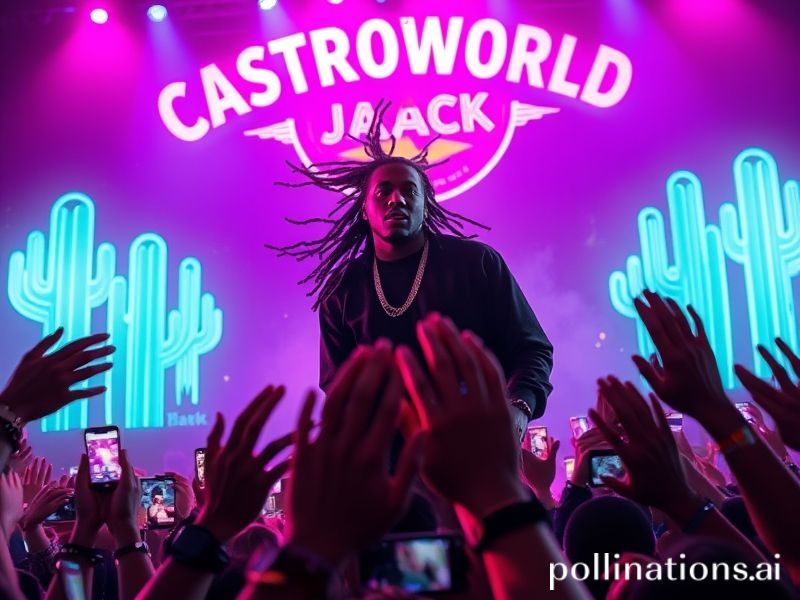Travis Scott: Exporting American Dread in 808s, Burgers, and $2,000 Jeans
Travis Scott: The Global Pied Piper of Retail Therapy
By: Our Man in the Duty-Free Lounge
Astroworld isn’t just a theme park Travis bulldozed back to life in his own image—it’s now the operating system for a planet that can’t decide if it wants to rage or just return the sneakers. From Lagos to Ljubljana, the 32-year-old Houstonian has managed to export a uniquely American cocktail of low-frequency dread, hypebeast serotonin, and liability waivers. If that sounds like imperialism with a better soundtrack, congratulations, you’ve passed Intro to Late-Stage Capitalism.
Let’s start where most of the world starts its day: the algorithm. When Scott drops a track, Spotify’s servers in Stockholm groan like Nordic tectonic plates. Within minutes, Ubers in São Paulo vibrate with the same 808 that just rattled a flat in Seoul. The song itself is almost irrelevant—what matters is the synchronized cortisol spike. One could argue this is the closest humanity has come to a universal language since Esperanto died of embarrassment.
Meanwhile, the merchandise drop follows the music like an over-caffeinated customs officer. A McDonald’s combo meal in 2020 turned the Quarter Pounder into a trans-Pacific status symbol; Indonesian teenagers scalped the cardboard boxes on Carousell for the price of an actual cow. When Scott collaborated with Dior, the French house’s atelier spent 200 hours embroidering a pair of jeans that retail for more than Burkina Faso’s per-capita GDP. The jeans sold out in six minutes, presumably to people who will never sit down in them, lest they crease the apocalypse.
But the true international magic happens at the concerts, or what the insurance industry clinically calls “mass gatherings.” Scott’s 2021 Astroworld Festival in Houston became a tragic Rorschach test viewed in real time by everyone with Wi-Fi. Europeans clutched their pearls, Latin Americans muttered “hold my beer,” and Chinese censors simply hit delete. The incident forced governments on three continents to “review crowd-control strategies,” which is bureaucrat-speak for “Google ‘how Travis Scott concert’ and pray.” South Korea’s parliament even cited Astroworld while passing new safety laws for K-pop gigs—cultural feedback loop achieved.
Then there’s the sneaker-industrial complex. Nike’s Air Jordan 1 “Cactus Jack” is the de facto reserve currency of secondary-market apps. In Nairobi, a single pair can flip for enough to cover a semester of university; in Moscow, they’re worn ironically by teenagers who’ve never heard “Goosebumps” but know resale value better than their own blood type. The shoes, like the man, have become a hedge against local inflation—wearable Bitcoin with foot sweat.
Critics—those endangered species who still read past the chorus—note that Scott’s brand is built on controlled chaos, a perpetual teeter on the brink that flatters the consumer’s nihilism without ever falling all the way in. It’s disaster capitalism wearing a smiley-face grill. But try telling that to the kid in Jakarta who just spent two weeks’ wages on a hoodie that reads “Wish You Were Here” in upside-down letters. For him, the garment is a passport to a borderless tribe where anxiety is the lingua franca and nobody asks for a visa.
And so, in the grand tradition of Coca-Cola and AK-47s, Travis Scott has given the world another American product that defies import tariffs and moral judgment. Whether you’re a hedge-fund quant in Zurich timing a resale bot or a street vendor in Accra selling knockoff action figures, you’re plugged into the same feedback loop: hype, dread, release, repeat. It’s either the most honest mirror globalization has ever held up to itself or the loudest distraction yet from the fire in the lobby. Probably both. Pass the fries—limited edition, of course.







